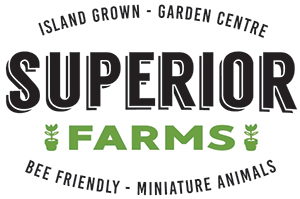
More and more, businesses are being pressured to employ environmentally responsible options in their day to day operations. We take this concern seriously, which is why we are constantly looking for ways to have as little impact on our environment as possible.
We’ve made an effort to really watch what’s trending in terms of which plants require less water and attract *the good* insects. Plants that are heat tolerant, deer resistant, and those that attract butterflies and bees, all score big with us. We have a plan for improving our practices where we can, and have already implemented procedures to operate our business in a way that leaves the smallest environmental impact possible. Read on to learn how we do this.
Greenhouse operations are heavily dependent on irrigation water. In many cases, municipal water is very expensive and contains Chlorine and other chemicals which is not beneficial to the crops. In the summer time, the municipal water can also be too warm for some crops affecting plants to wilt or cause deceases from warm water in the root zone.
We are fortunate to be on our own well system that provides us with great pressure, fantastic tasting, clear, unchlorinated water. We prefer to hand water our plants versus employing a mechanized watering system. We find that we waste much less water through run-off and are able to provide more personalized attention to our plants.
We seed a number of our plants ourselves, but it is not always cost effective to do so depending on the finish time of the plant. When we don’t do it ourselves, we look for options that will bring the cuttings and plugs to us using the most direct route possible, in order to reduce emissions caused by transportation.
When we send trucks for delivery, we plan our routes so that we are delivering full cube vans of inventory, and when orders don’t require full trucks, we use a trailer towed behind a half-tonne truck in order to reduce emissions.
What about the Neonictinoids?
In the late 1990s, Neonicotinoids came under increasing scrutiny over their environmental impacts. Neonicotinoid use was linked in a range of studies to adverse ecological effects, including honey-bee colony collapse disorder (CCD) and loss of birds due to a reduction in insect populations. In 2013, the European Union and a few non EU countries restricted the use of certain neonicotinoids (source: Wikipedia)
Neonics are still widely used in our industry because it’s a cheap, easy way to prevent insect damage to greenhouse crops. At Superior Farms, WE DO NOT USE Neonics. A significant portion of our property contains marshland that we provide to Ducks Unlimited, so it was important for us to do what we could to maintain the health of our bird population, and any of the insects that they might feed on. Read on for further information: Neonic Harms More Than Just The Bees
We do like to employ the use of ladybugs in our pest prevention program. Read more about the helpful little guys here: Natural Insect Control

